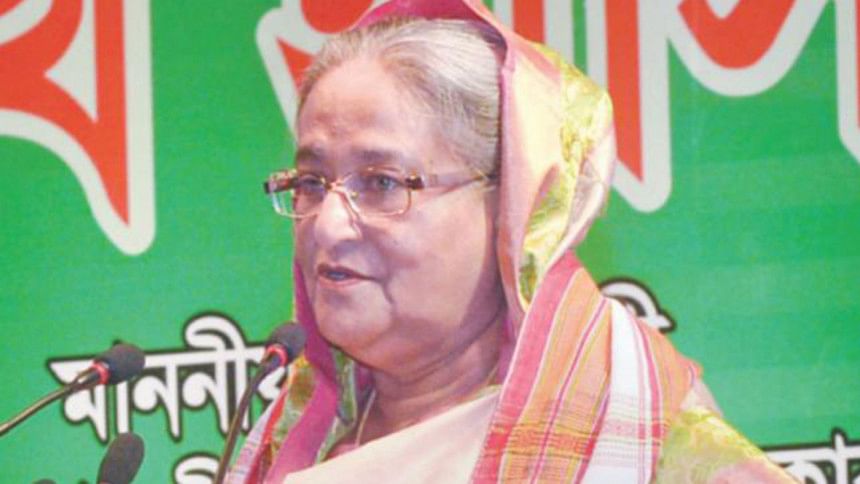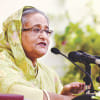CHT people to enjoy land ownership

Urging the Chittagong Hill Tracts people to maintain peace and discipline, Prime Minister Sheikh Hasina yesterday assured that they would enjoy the ownership of their land.
"Development is not possible without maintaining peaceful atmosphere ... so, keeping this in mind, I call upon all to work together to this end," she said.
The PM said the ownership of the land in the CHT would not be determined by the British-era laws; rather the people of the area would enjoy the ownership of the land as the people of other regions in the country did.
"We want to establish such a system so that the (Chittagong) Hill Tracts region people can enjoy the ownership of their land ... we want to ensure it," she said.
The premier said this while opening the 4000th Para Kendra (Village Centre) in CHT through a videoconference from the Sonargaon Hotel in the capital.
She also unveiled the cover of a book titled "Chittagong Hill Tracts: Journey towards Peace and Prosperity."
The Chittagong Hill Tracts affairs ministry, the CHT Development Board and UNICEF jointly organised the inauguration ceremony of the 4000th Para Kendra in Mitingachhari of Rangamati's Kaptai.
PM's International Affairs Adviser Gowher Rizvi, Chairman of the Parliamentary Standing Committee on CHT Affairs RAM Ubaidul Muktadir Chowdhury and Unicef Country Representative Edouard Beigbeder attended the function as special guests.
State Minister for CHT Affairs Bir Bahadur Ushwe Sing presided over the function, while CHT Affairs Secretary Naba Bikram Kishore Tripura delivered the welcome address.
Ministers, PM's advisers, parliament members, diplomats, high civil and military officials and 400 workers of Para Kendra were present on the occasion.
Regarding the dispute over land, the PM said the government formed the Land Commission and if the commission could sit regularly, the problem would be solved.
Recalling the signing of the CHT Peace Accord that ended two-decade insurgency problem in the CHT region, Hasina said the lion's share of the deal had already been implemented and the rest would be executed surely.
"We've signed the peace accord and we're implementing it ... we've withdrawn 250 army camps from the region."
The PM said there was no border outpost of the BGB in the area. "But we've set up such BOPs [border outposts] in the area ... we're working to improve the living standards of every people of the region."
Hasina said her government included those, who had surrendered arms, in the police and Ansar and VDP and arranged their training.
Elaborating the background of the peace accord, the PM said the government of any country always tried to solve any problem, but no steps were made by the post-1975 governments to solve the insurgency problem in the CHT region.
"Our government solved the problem in the fastest possible time as it was able to diagnose the disease," she said.
Hasina said 1,800 rebels surrendered their arms to her on February 10 in 1998 at Khagrachhari Stadium. "The insurgents did it as they had trust and confidence in me."
She said the government wanted to develop the whole country in a balanced way as the government gave importance to upliftment of the socioeconomic status of the country.
"One region of Bangladesh will remain neglected; this will never happen ... it's not possible to develop the country keeping one region neglected. So, we are giving special attention to the development of the neglected areas of the country; overall development of the CHT area is our responsibility."
The premier said her government was working relentlessly for the development of the CHT region in line with the peace accord. They have been implementing massive projects in the region, she added.
In this connection, Hasina said there was no separate budget for the three hill districts before the peace accord. "Our present government allocated Tk 915.83 crore for the fiscal year 2017-18, while different ministries are implementing projects involving Tk 9,000 crore in the region."
The premier said different schemes were being implemented in education, health, agriculture and communication sectors for overall economic development. "As many as 17 projects included in current ADP are under implementation."
Hasina said for the development of education, a science and technology university and a medical college had been established in Rangamati.
She said 4,000 village centres, 3,500 para (village) development committees and 1,935 para (village) women development groups had been formed to reach the outcome of development to every house of 4,811 villages of 26 upazilas in the three hill districts.
Earlier, a video documentary highlighting the development activities in the three districts through Integrated Community Development Project was screened on the occasion.

 For all latest news, follow The Daily Star's Google News channel.
For all latest news, follow The Daily Star's Google News channel. 






Comments